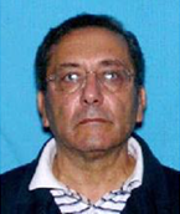As the feds have now demonstrated a basic understanding of stealin', I await actions of the Child Welfare System.
$150 million is but a drop in the bucket when dealing with Medicaid Fraud in Child Welfare.
Nursing home mogul Philip Esformes sentenced to 20 years for $1.3 billion Medicaid fraud
I believe we shall start seeing significant movement as we are entering the 2020 campaign season.
Michigan doctors tossed in jail for fueling opioid epidemic: They're 'killing us'
 West Bloomfield businessman Mashiyat Rashid convicted in 2018 of running a $150 million scheme involving opioids, poses in front of a private jet and his Rolls Royce. Prosecutors said the scheme bankrolled his lifestyle and used this photo as evidence against him. Rashid is pictured on the right. This image has been redacted by the US Attorney's Office.
West Bloomfield businessman Mashiyat Rashid convicted in 2018 of running a $150 million scheme involving opioids, poses in front of a private jet and his Rolls Royce. Prosecutors said the scheme bankrolled his lifestyle and used this photo as evidence against him. Rashid is pictured on the right. This image has been redacted by the US Attorney's Office.They were supposed to do no harm.
But like the pill addicts they preyed on, hundreds of Michigan doctors got hooked on greed, fueling an opioid epidemic that kills more than 130 Americans a day.
Federal authorities say metro Detroit doctors are among the leading culprits behind the opioid crisis, writing thousands of phony pain pill prescriptions, billing the government for millions, and flooding the streets with highly addictive drugs that kill more people in Michigan than both guns and car accidents.
The wrongdoers are many: An emergency room doctor who got tired of long work hours and joined a pill mill. A cardiologist who turned into a drug dealer after facing bankruptcy. A surgeon who allegedly got patients hooked on pain pills, then forced them to undergo painful procedures to get more pills.
It's been a lucrative scheme for many doctors and their cohorts: Private jet trips. Mansions. Luxury cars. Designer clothes and watches.
But the feds have caught on, and they're locking crooked doctors up in record numbers. I believe the feds have caught on to the trafficking tiny humans operations in the child welfare system. Over the last decade, more than 100 doctors have been charged with health care fraud and/or unlawful pill prescribing.
Data shows one Michigan doctor goes to prison every month for health care fraud. According to the Department of Justice, more doctors and pharmacists have been sentenced in southeastern Michigan for fraud than in any other state, except New York.
The average sentence is four years, the highest 45, handed down in 2014 to Oakland County cancer specialist Farid Fata, who intentionally misdiagnosed people with cancer, pumped them with unnecessary chemotherapy and raked in $17 million in fraudulent billings.
The government notes that only a small percentage of doctors are causing all this damage — about 1% in Michigan — but their actions have triggered catastrophic results: Opioids killed more than 70,000 Americans in 2017 alone.
How medical drug rings work
Dr. Alex Kafi, 70, of West Bloomfield, was sentenced to five years in prison for writing medically unnecessary prescriptions for more than 23,000 pills of oxycodone — one of the most abused opiates in southeastern Michigan, prosecutors said. He wrote the prescriptions without meeting or communicating with patients, but instead conspired with patient recruiters who provided him with lists of patients, along with $300 for every prescription he wrote.
Kafi's scheme worked like a typical opioid ring where doctors and clinic operators hire patient recruiters to find Medicare recipients. The recruiters target cities like Detroit, which has a large population of poor, unemployed and disabled individuals who qualify for Medicare.
The recruiters pay the Medicare recipients between $50-$150 to show up at doctor's offices in the suburbs for appointments. There, the doctors use the fake patient's Medicare information and fraudulently bill the government for unnecessary pills and services.
Cooperating pharmacists fill the fake prescriptions. The recruiters then sell the pills on the street for a hefty profit: Oxycodone has doubled in the last two years, from $20 to $40 a pill, according to the U.S. Attorneys Office. Opana, another highly abused painkiller known on the street as "oranges," has jumped from $25 to $50 a pill.
Everyone involved makes money, with the taxpayers picking up the tab.
Over the last decade, 415 defendants have been charged with running these schemes in southeastern Michigan, collectively billing the government more than $1 billion for illegal prescriptions and services. Of that, the government paid $557 million, none of it for legitimate health care needs.
 The Department of Justice set up a strike force here in 2009 to snuff out the corrupt doctors, pharmacists, clinics and recruiters. At that time, Detroit had become one of the nation’s “new frontiers” for Medicare fraud, with many scammers fleeing a federal crackdown in Miami and heading north to make their money.
The Department of Justice set up a strike force here in 2009 to snuff out the corrupt doctors, pharmacists, clinics and recruiters. At that time, Detroit had become one of the nation’s “new frontiers” for Medicare fraud, with many scammers fleeing a federal crackdown in Miami and heading north to make their money.Detroit proved fruitful. There was a big supply of patient recruiters, a big supply of poor people on Medicare and an inexhaustible supply of pills.
Ten years later, the schemers are trying to outsmart the authorities with new tricks, like running cash-only pain clinics that are harder to track, working out of secret offices that have no "doctor" signs on the door, or running pill rings that cross state lines and involve players from coast to coast.
Nevertheless, the Department of Justice believes its crackdown on Michigan doctors is working, if financial savings are any indication. According to government data, Michigan is the only state in the country where Medicare costs have gone down over the last decade.
For example, nationwide, Medicare costs are $57 billion higher than they were in 2010. But in Michigan, they are more than $1 billion less; half of this involves money that used to go to doctors for pills.
"It's taken 10 years to do this ... to get rid of the people who are killing us," said Assistant U.S. Attorney Wayne Pratt, chief of the health care fraud unit in Detroit.
'She wanted an easier life'
While Michigan's indicted physicians have different stories, backgrounds and varying levels of criminal involvement, prosecutors maintain they had one thing in common: greed.
Emergency room doctor Jennifer Franklin of Harrison Township had grown weary of her long work hours, prosecutors said. So she took a job with a multimillion-dollar drug trafficking organization, peddling pain killers out of an office suite on Greenfield Road.
 Almost every day, fake patients would arrive at suite 116, knock on the door and give a code name to get in to see the doctor. Each appointment cost $500-$600 cash, which was paid for in advance by patient recruiters.
Almost every day, fake patients would arrive at suite 116, knock on the door and give a code name to get in to see the doctor. Each appointment cost $500-$600 cash, which was paid for in advance by patient recruiters.The patients had no real ailments. They came for pain pill prescriptions, and 41-year-old Dr. Franklin obliged.
In almost two years, Franklin wrote more than 2,000 fraudulent prescriptions for oxycodone that sold on the black market. To make the pills look legitimate, she also wrote prescriptions for “maintenance” drugs for common ailments like blood pressure or heart disease. She did this in exchange for $100 per patient.
Evidence obtained in a $150 million health care fraud ring involving opioids. This is a bank receipt for a $500,000 cash withdrawal made by the ringleader, who hid the money in a closet after learning he was under investigation. Source: U.S. Attorneys Office (Photo: U.S. Attorneys Office)
Among her patients was an undercover DEA agent who visited her three times in 2014. She conducted no physical exam, medical test or procedure, but prescribed him painkillers anyway.
Each appointment lasted about five minutes.
“In one recorded undercover video, Franklin spent more time discussing the water temperature in Lake St. Clair than she did inquiring of the undercover patient’s alleged symptoms,” prosecutors wrote in court documents. “She asked how the patient’s back was doing and if he was taking any other medications. She spent the rest of the time discussing how she and her husband were ‘boating people’ and that they had spent a leisurely weekend cooking out on the lake.”
In 2018, Franklin was sentenced to 33 months in prison after previously pleading guilty to conspiracy to distribute controlled substances.
When asked to explain her crime, she told the probation department: “I never saw my spouse and was missing out on activities. This was offered to me as a job.”
Prosecutors saw it differently.
“She wanted an easier life,” they said.
Down the street from Dr. Franklin, another doctor was running the same scam, for the same pill mill.
Dr. Carlos Godoy, an 80-year-old cardiologist from Farmington Hills, worked out of suite 380 at 21700 Greenfield Road, where he wrote 4,000 unnecessary oxycodone prescriptions.
Godoy maintained he didn't know what he was getting into.
In court documents, lawyers for Godoy said that the cardiologist was facing financial hardship when he got involved in a pill mill. A chiropractor had offered him a job prescribing drugs for auto accident patients, something he had never done before, they wrote.
But Godoy had fallen on hard times. So he did it.
"He was in the middle of a personal bankruptcy and he was in the process of losing everything, including his home," Godoy's lawyers wrote in court documents, arguing the doctor didn't know the extent of his crime.
Godoy believed that the pain medications he prescribed were going only to addicts, not "assisting in street sales of powerful pain medication for profit."
But that's precisely what he was doing, said prosecutors, who pushed for a four-year prison sentence. Godoy ended up with one year instead.
The chiropractor who masterminded it all, 52-year-old Boris Zigmond of West Bloomfield, who moved to the United States from Russia more than 20 years ago and led a large-scale drug ring out of Detroit, got 15 years in prison.
Zigmond, prosecutors said, was the one who set up the doctors in office suites, paid for the suites, and paid the cooperating physicians for writing the opioid prescriptions. The federal investigation that led to his downfall was dubbed "Operation To Russia with Love."
The probe included wiretapped telephone conversations that were mostly in Russian.
According to court documents, Zigmond, who is a U.S. citizen, reaped $5.7 million in profits off his drug ring, which he went to great lengths to hide. Prosecutors said he stashed $340,000 cash in a Florida storage unit in his father's name, and another $270,000 cash in a closet in West Bloomfield. He also divvied up $660,000 in seven bank accounts with the help of his associates and family members.
Prosecutors noted that Zigmond's scheme was especially hard to detect given that he didn't see patients or prescribe drugs, and dealt only with cash, no insurance.
But the DEA got tips, and watched him for years.
In 2016, an indictment was unsealed, charging Zigmond, two doctors, three recruiters and four assistants. All were convicted.
Patient pain yields life of luxury
In assessing how lucrative the opioid trade is, one need look no further than the case of West Bloomfield millionaire Mashiyat Rashid, a 38-year-old CEO with TriCounty Wellness Group who lived like a king with the help of crooked doctors.
Rashid had a Lamborghini and Rolls Royce Ghost, bought luxury clothes from retailers like Hermes, collected designer watches, built a mansion and sat courtside at NBA games. He enjoyed this lifestyle by running a $150 million scheme in which doctors required patients to undergo harmful back injections in exchange for pain pills.
Rashid paid the doctors based on how many injections Medicare paid for. In return, the doctors conducted repetitive injections to increase revenue for themselves and Rashid, whose ill-gotten ways eventually caught up to him.
 Last October, Rashid pleaded guilty to conspiracy, wire fraud and money laundering. As part of his plea agreement, he agreed to forfeit $51.3 million, any property tied to his crimes, and his Detroit Pistons season tickets.
Last October, Rashid pleaded guilty to conspiracy, wire fraud and money laundering. As part of his plea agreement, he agreed to forfeit $51.3 million, any property tied to his crimes, and his Detroit Pistons season tickets."While people were suffering, this corporate executive lived in luxury funded by ill-gotten gains," then-Attorney General Jeff Sessions said following Rashid's guilty plea, stressing: "We're not through yet."
Rashid was indicted alongside 14 other defendants, including seven physicians. All have pleaded guilty. Rashid is scheduled to be sentenced in February, though he's already locked up against his wishes.
Rashid argued for bond, but prosecutors convinced a judge to keep him locked up pending the outcome of his case, arguing he "has significant incentive and ability to flee from the United States."
 |
| Mashiyat Rashid |
Two days after the bank withdrawal, federal agents searched Rashid's home and found $508,400 in cash stuffed in a purse, plastic bag and tan zipper case that were hidden beneath clothing in a closet, court records show.
Letting Rashid roam free was too risky, argued the prosecutors, who had been burned before.
Since 2011, 16 medical professionals charged with crimes have fled the country, including doctors who took off while awaiting sentencing.
Over the government's objections, judges granted these physicians bond, trusting them to return to court at the most crucial stage in the case: after they had been convicted, and knew they were facing prison time.
Among the fugitives is Dearborn Heights Dr. Basil Qandil, who was convicted almost five years ago of multiple drug distribution and health care crimes. After the verdict was read, the doctor was trusted to return to court to face his punishment: up to 20 years in prison.
 |
| Basil Qandil |
Dearborn Heights Dr. Basil Qandil has been on the run for five years, fleeing after a jury convicted him of health care fraud. (Photo: US Attorneys Office)
Qandil skipped town, and has been missing ever since.
The same thing happened with Dr. Mikhayl Soliman of Plymouth, who was convicted by a federal jury in 2015 of billing Medicare for services he never performed and unlawfully prescribing painkillers.
After the verdict came down, prosecutors asked the judge to lock him up right away. They argued that he was facing at least 20 years in prison, had no incentive to show for sentencing, and had previously applied for a forbidden passport using a California address, in violation of a court order.
Dr. Mikhayl Soliman has been missing for four years, fleeing after a federal jury convicted him in 2015 of billing the government for no work and writing prescriptions for painkillers that were sold on the street. (Photo: US Attorneys office)
 |
| Mikhayl Soliman |
A warrant was issued for his arrest. He has been missing ever since.
How America got hooked
Twenty years ago, the government found that pain is undertreated in America and started evaluating hospitals and clinics on pain management. It rolled out new pain management standards, which required doctors to ask every patient about their pain.
Smiley-face pain charts started popping up everywhere. The pharmaceutical companies claimed opioids aren't addictive. And a painkiller-prescription wave started.
Devastation followed.
As the number of painkiller prescriptions in the U.S. nearly quadrupled from 1999-2017 — so did overdose fatalities.
The government turned its focus on the drivers behind this crisis: the doctors who write the prescriptions, and the pharmacists who fill them. Pratt said that it's only a small percentage of Michigan's 39,000 doctors who are causing the problem. Last year, for example, two-thirds of the most abused opiates were prescribed by 450 doctors. That’s about 1 percent of all the doctors in the state.
“You’ve got a couple hundred people fueling the problem,” Pratt said.
But their missteps have taken a tremendous human toll: In 2017, opioid-related overdose deaths in Michigan reached a record high: nearly 2,000 dead.
Voting is beautiful, be beautiful ~ vote.©
No comments:
Post a Comment